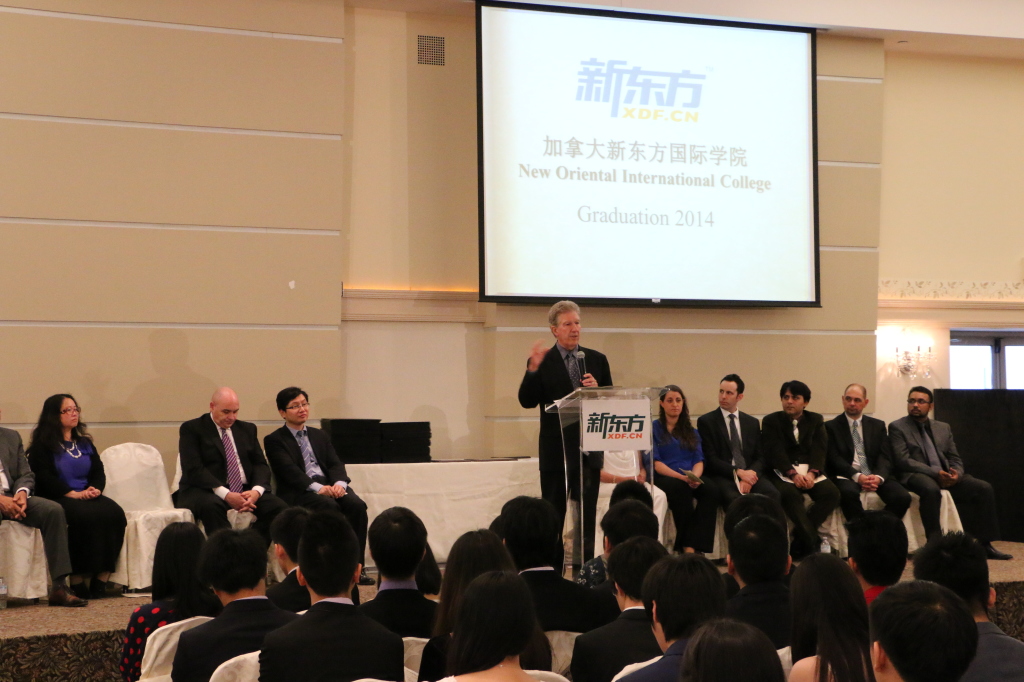By Jeffrey Beard
Jeffrey Beard served as Director General for the International Baccalaureate Organization from 2006 through 2013. He is now the Chairman and Founder of Global Study Pass, a UK-based organization that offers international study abroad programs that give high school students from around the world opportunities to learn and collaborate together to develop essential skills for university and employability.
I’ve spoken for some time (in my former role as head of the International Baccalaureate) about the trends in international education and how more students from the east are studying abroad and vying for the best university spots the west has to offer. A systematic and disciplined approach to this is happening in Canada and, increasingly, across the western world.
It’s been clear that study abroad trends at university-level have been increasing for years, with students from the east searching out opportunities to study in the west. Why is this? It’s because they and their parents view education as an investment in their future. They see it as a way up and out. And they view the ability to speak English (the international language of business), the opportunity to understand the culture of the west, and the chance to acquire 21st century and global citizenship skills as their ticket to future success in this increasingly flat world.
What hasn’t been so obvious is how this trend towards studying abroad is no longer just a tertiary expectation, but is now involving the younger, secondary school market. Reports state that anywhere from 25,000 to 75,000 Chinese secondary students are currently engaged each year in study abroad programs; mostly in the USA, but also in Canada and the UK, and the trend is growing each year.
These students know that in today’s competitive and interconnected society, having not only the academic knowledge, but also the right language and the global context to succeed anywhere in the world will give them a competitive advantage. Initially this means university acceptances, and later, as employees in the international job market.
I recently visited New Oriental International College in Canada. Here’s how the school describes itself and its faculty: “New Oriental International College… provides university preparation courses to international students, as well as the opportunity to earn an Ontario Secondary School Diploma…. It is our goal to become a bridge for Chinese students to prepare for acceptance to Canadian universities and colleges… We empower students to achieve their academic potential, build self-confidence, and develop a global vision encompassing both traditional Chinese values and a modern mind-set.”
CEO Rongfeng (Roy) Huang told me that 85% of the school’s graduates receive offers from the University of Toronto. That on average, each student receives greater than four university offers, and a third are awarded university entrance scholarships.
Along with the Ontario Secondary School Diploma, the school has applied to offer the International Baccalaureate Diploma Programme, which, explained Roy, will further enhance its international reputation. The school is part of the New Oriental Education Group, the largest and most recognised training organisation in China which is, in terms of market value, the world’s largest education company. With 55 schools and 433 learning centres across 49 cities in China, it enrolls over 3 million students.
Of the hundred or so students that I met during my visit to the school, all were Chinese, all were totally focused on their learning, and all shared an air of determination. These students were selected from China to attend New Oriental. I was told their parents expect them to study hard, graduate, and go onto university. From joining the school with little or no English language skills, after just one year of complete language emersion (no Chinese to be spoken or written), their English skills are quite acceptable. After four more years studying in a Canadian university, their English will be excellent.
I spoke to graduate student, Nathan (Linshan) Zhang – all students adopt an English first name – and asked him whose idea it was to come to New Oriental; his or his parents? “Probably a bit of both,”he said.“My parents want the best for me and do not view the tuition they pay for me to come here as a cost, but as an investment. They know it will lead to greater success for me in life.”
When he applied for his university places earlier this year, Nathan received offers from seven universities, and an entrance scholarship of $8000 from Ottawa’s Carleton University. So is he confident of finding a job after university?“Oh sure,”he told me.“Say you’re a Chinese company opening up a branch office in the west; are they going to hire a local Chinese person and send him or her over here as an expat? Are they going to hire someone locally who can speak the English language, knows the local culture, but not know the Chinese culture? Or are they going to hire someone like me, who knows both cultures and both languages?” His logic works the other way too; for Canadian or US companies wanting to open a branch in China.
This was the take-away of this visit for me. All these students are moving to Toronto (and others to Vancouver too), because the immigration law is conducive to their coming; allowing them to study, achieve their high school diploma and attend Canadian university. Not only that, but it allows them to obtain permanent residency in Canada after they complete their post-secondary education. It’s for this reason that the pipeline is growing by the thousands every year.
It’s happening, in a different way, in the US too. USA Today recently reported that in 2013, more than 73,000 international students enrolled in US high schools. About two thirds – nearly 49,000 – received visas enabling them to pursue a U.S. high school diploma. That’s more than triple the number since 2004, when just under16,000 foreign students held such visas.
In Canada, the US and in Britain too, many cry out that their jobs are being taken away by such circumstances. What can these candidates learn from aspiring Asian students about being job market ready in the future? What many don’t realize is that, whether they take them first-hand, or through outsourcing, aspiring Asian students will likely take many more jobs in the future. It’s not that education standards in the west have slipped, but that other countries are now surpassing western nations by working harder, performing better, and aspiring higher. The best and the brightest from around the world will increasingly find their way into the most competitive markets. For students from any nation, acquiring more global skills will be one of the keys to success.






Recent Comments